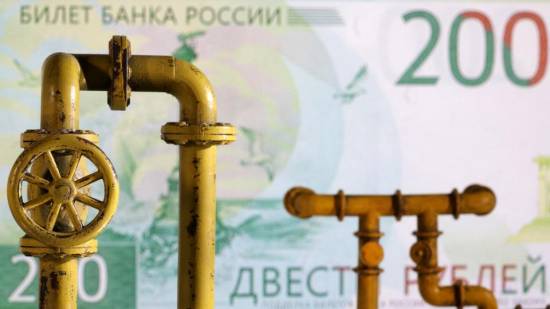Russia made $158B in energy exports since Ukraine conflict Featured
Russia raked in a whopping $158 billion in energy exports in the six months following its war on Ukraine, with the EU accounting for more than half, a think tank has said.
The Centre for Research on Energy and Clean Air called for more effective sanctions against Moscow after the incursion sent oil, gas and coal prices soaring.
"Surging fossil fuel prices mean that Russia's current revenue is far above previous years' level, despite the reductions in this year's export volumes," said the Finland-based organisation said on Tuesday.
Natural gas prices have recently soared to record levels in Europe as Russia chokes off supplies. Crude oil prices also jumped following the assault, although they have since pulled back.
"Fossil fuel exports have contributed approximately 43 billion euros to Russia's federal budget since the start of the incursion, helping fund war crimes in Ukraine," said CREA.
The figures concern the six months following Russia's February 24 assault of Ukraine.
During this period, the CREA estimated that the European Union was the top importer of Russian fossil fuel exporters, at 84.6 billion dollars. China followed at 34.7 billion dollars and Türkiye at 10.6 billion dollars.
While the EU has stopped purchases of Russian coal, it is only progressively banning Russian oil and it has not adopted any limits on the imports of natural gas, upon which it is highly dependent.
Price cap on Russian crude
The CREA said the EU ban on Russian coal imports has been effective. After the ban went into effect, Russian coal exports fell to their lowest levels since the conflict began.
"Russia failed to find other buyers to replace falling EU demand," said the CREA.
But it called for stronger rules and enforcement concerning Russian oil exports, urging the EU and the UK to use their leverage in global shipping.
"The EU must ban the use of European-owned ships and European ports for shipping Russian oil to third countries, while the UK needs to stop allowing its insurance industry to participate in this trade," said the CREA.
The G7 countries, meanwhile, vowed on Friday to push forward urgently to impose a price cap on Russian crude, a move that would deprive Russia of much of the revenue it now makes from its oil exports.
The United States has been arguing for the imposition of a price cap for months, arguing that Western bans on Russian energy products were contributing to the price hikes that helped Moscow finance its fighting effort.
Source: AFP


